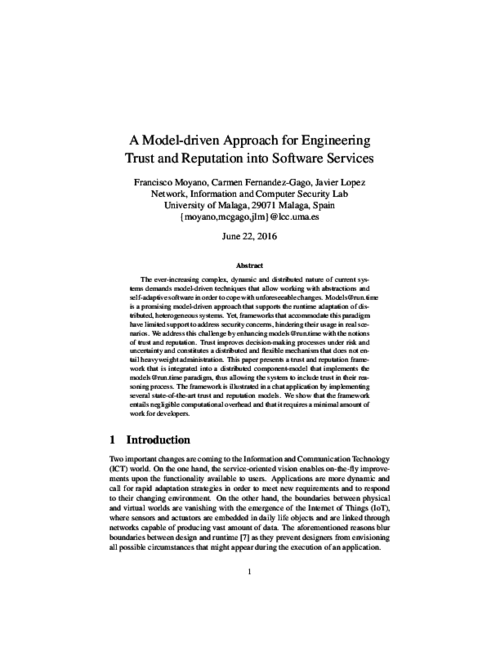The 14th International Conference on Network and System Security (NSS 2020), vol. 12570, Springer, pp. 327-341, 11/2020.
Abstract
Trust negotiation represents a suitable approach for building trust in online environments, where the interacting entities are anonymous. It covers important criteria on security and privacy. In this work, we propose a method for implementing our model specification that handles trust negotiation. We define the structure of the trust negotiation module that is a standalone unit capable of negotiating on its own. It may be included to any software by its defined interfaces. We realise our method with a ride-sharing scenario and four trust negotiation strategies that we apply in order to validate our design and implementation. We propose a solution that is fully customisable based on different requirements. The proposal provides guidelines for developers in the process of including trust negotiation into their software.
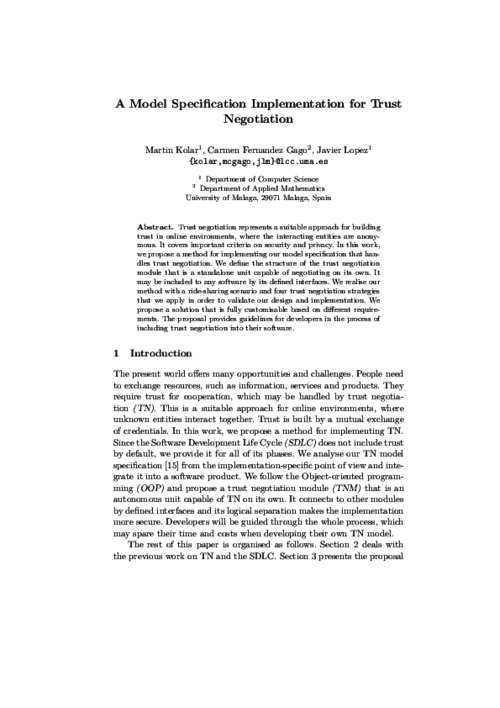
Computers & Security, vol. 84, issue July 2019, Elsevier, pp. 288-300, 04/2019. DOI
Abstract
Trust negotiation is a type of trust management model for establishing trust between entities by a mutual exchange of credentials. This approach was designed for online environments, where the attributes of users, such as skills, habits, behaviour and experience are unknown. Required criteria of trust negotiation must be supported by a trust negotiation model in order to provide a functional, adequately robust and efficient application. Such criteria were identified previously. In this paper we are presenting a model specification using a UML-based notation for the design of trust negotiation. This specification will become a part of the Software Development Life Cycle, which will provide developers a strong tool for incorporating trust and trust-related issues into the software they create. The specification defines components and their layout for the provision of the essential functionality of trust negotiation on one side as well as optional, additional features on the other side. The extra features make trust negotiation more robust, applicable for more scenarios and may provide a privacy protection functionality.
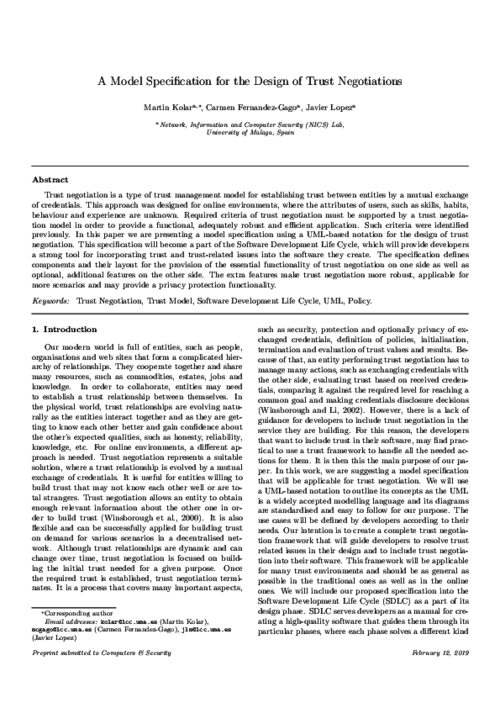
Computers & Security, vol. 77 , issue August 2018, Elsevier, pp. 773-789, 2018. DOI
Abstract
Trust negotiations are mechanisms that enable interaction between previously unknown users. After exchanging various pieces of potentially sensitive information, the participants of a negotiation can decide whether or not to trust one another. Therefore, trust negotiations bring about threats to personal privacy if not carefully considered. This paper presents a framework for representing trust negotiations in the early phases of the Software Development Life Cycle (SDLC). The framework can help software engineers to determine the most suitable policies for the system by detecting conflicts between privacy and trust requirements. More precisely, we extend the SI* modelling language and provide a set of predicates for defining trust and privacy policies and a set of rules for describing the dynamics of the system based on the established policies. The formal representation of the model facilitates its automatic verification. The framework has been validated in a distributed social network scenario for connecting drivers with potential passengers willing to share a journey.
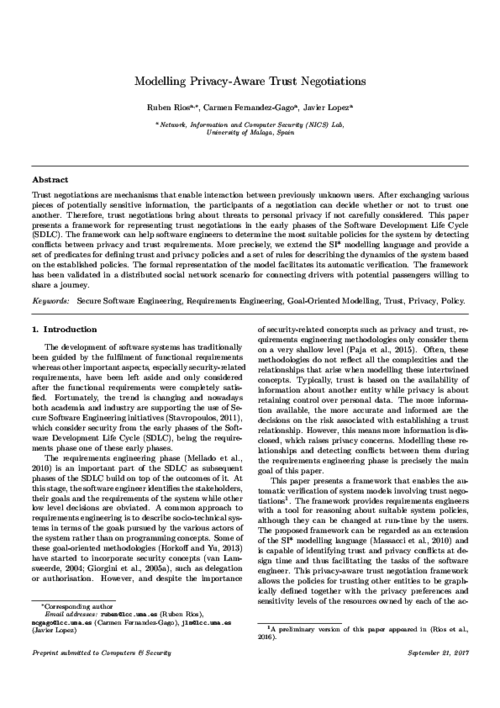
Information Sciences, vol. 396, Elsevier, pp. 72-82, 2017. DOI
Abstract
The Internet of Things (IoT) is a paradigm based on the interconnection of everyday objects. It is expected that the ‘things’ involved in the IoT paradigm will have to interact with each other, often in uncertain conditions. It is therefore of paramount importance for the success of IoT that there are mechanisms in place that help overcome the lack of certainty. Trust can help achieve this goal. In this paper, we introduce a framework that assists developers in including trust in IoT scenarios. This framework takes into account trust, privacy and identity requirements as well as other functional requirements derived from IoT scenarios to provide the different services that allow the inclusion of trust in the IoT.
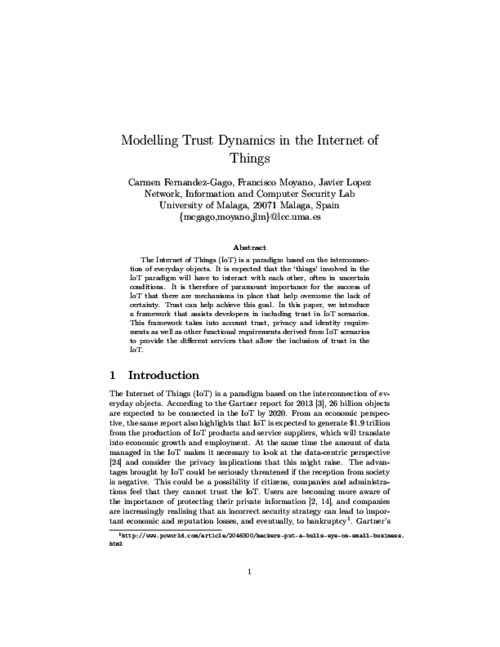
Journal of Network and Computer Applications, vol. 69, Elsevier, pp. 134-151, 04/2016.
Sixth European Workshop on Public Key Services, Applications and Infrastructures (EuroPKI’09), LNCS 6391, Springer, pp. 225-238, 2009. DOI
Abstract
Deciding who to trust in the internet of services paradigm is an important and open question. How to do it in an optimal way is not always easy to determine. Trust is usually referred to a particular context whereas a single user may interact in more than one given context. We are interested in investigating how a Federated Reputation System can help exporting trust perceptions from one context to another. We propose a model for deriving trust in online services. In this context, trust is defined as the level of confidence that the service provider holds on the subject interacting with it to behave in a proper way while using the service. Thus, we derive trust by using the reputation values that those users have gained for interacting with these services.
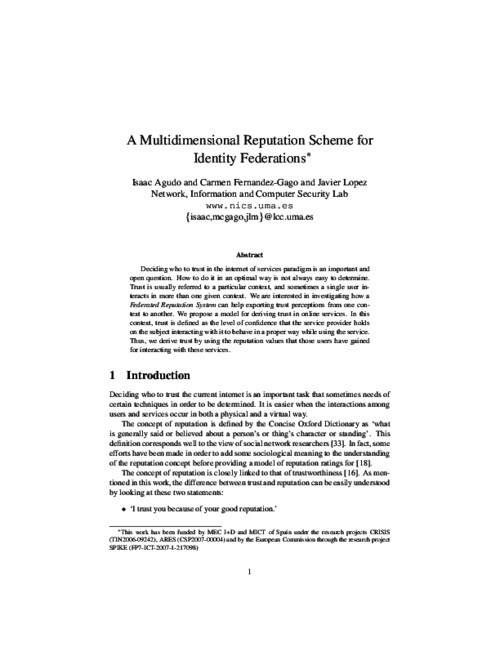
5th International Conference on Trust, Privacy and Security in Digital Business (TrustBus’08), LNCS 5185, Springer, pp. 28-37, 2008. DOI
Abstract
Trust is an important factor in any kind of network essential, for example, in the decision-making process. As important as the definition of trust is the way to compute it. In this paper we propose a model for defining trust based on graph theory and show examples of some simple operators and functions that will allow us to compute trust.
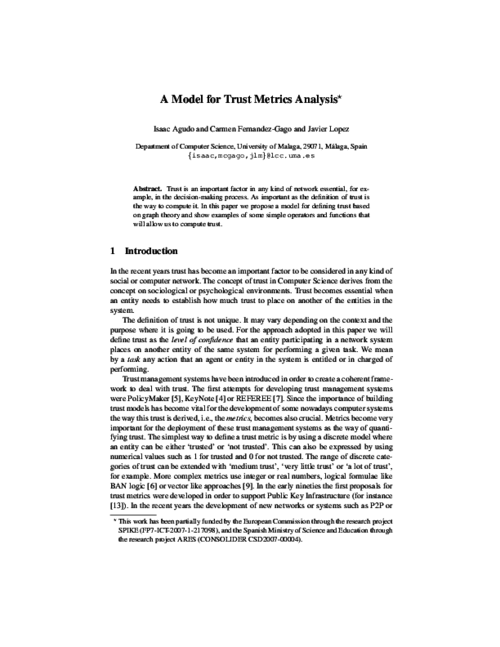
 ]
] 